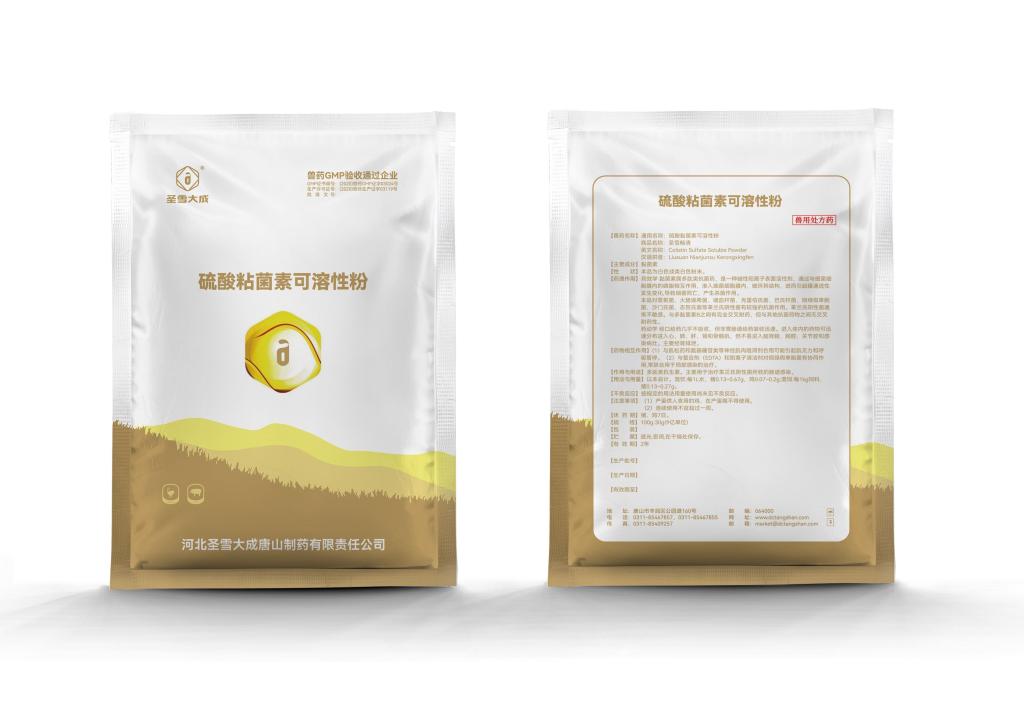Tel:+8618231198596

News
 CONTACT
CONTACT
 CONTACT
CONTACT
- Linkman:Linda Yao
- Tel: +8618231198596
- Email:linda.yao@dcpharma.cn
- Linkman:CHARLES.WANG
- Department:Overseas
- Tel: 0086 0311-85537378 0086 0311-85539701
News
Current Position:
Home >
News
>Colistin Sulfate Soluble Powder: Charting a Course for Sustainable Agriculture.
Colistin Sulfate Soluble Powder: Charting a Course for Sustainable Agriculture.
TIME:2024-01-23
I. Understanding Colistin Sulfate Soluble Powder:
Colistin Sulfate, a polymyxin-class antibiotic, is commonly used in veterinary medicine to treat or prevent bacterial infections in livestock. Administered as a soluble powder, it provides a convenient means of incorporating the antibiotic into animal feed or drinking water. This section explores the characteristics and applications of Colistin Sulfate Soluble Powder, laying the foundation for its role in sustainable agriculture.
II. Responsible Use and Antibiotic Stewardship:
At the forefront of sustainable agriculture is the concept of responsible antibiotic use and stewardship. This section delves into the principles of responsible use, emphasizing the importance of veterinary oversight, proper dosage administration, and adherence to withdrawal periods. Antibiotic stewardship is a crucial aspect of sustainable agriculture, as it seeks to mitigate the risk of antibiotic resistance, a global concern affecting both animal and human health.
III. Alternatives and Complementary Approaches:
To truly promote sustainability in agriculture, exploring alternatives and complementary approaches to antibiotic use is imperative. This section discusses alternative therapies, such as probiotics, prebiotics, and immune-boosting supplements, alongside management practices like improved biosecurity measures and vaccination programs. Integrating these strategies with judicious Colistin Sulfate use contributes to a holistic and sustainable approach to animal health.
IV. Disease Prevention and Biosecurity Measures:
Preventing diseases in livestock is a key pillar of sustainable agriculture. Biosecurity measures, including stringent hygiene protocols, controlled farm access, and proper waste management, play a crucial role in disease prevention. This section explores how the integration of Colistin Sulfate into comprehensive disease prevention strategies can contribute to overall animal health, reducing the need for therapeutic interventions.
V. Zoonotic Concerns and Public Health:
The potential transmission of antibiotic-resistant bacteria from animals to humans raises zoonotic concerns and public health considerations. This section examines the implications of Colistin Sulfate use in agriculture for human health, emphasizing the importance of monitoring and managing the risk of transmission. Collaborative efforts between the veterinary and public health sectors are essential to address these concerns responsibly.
VI. Environmental Impact and Resistance Genes:
Beyond the farm, the environmental impact of antibiotic use in agriculture is a critical consideration. This section explores the potential for antibiotic residues and resistance genes to enter the environment through manure runoff and other pathways. Sustainable practices involve proper waste management, treatment of effluents, and efforts to minimize the environmental impact of Colistin Sulfate use in agriculture.
VII. Veterinary Oversight and Regulation:
Ensuring veterinary oversight and compliance with regulations are critical components of sustainable agriculture. This section examines the role of veterinarians in prescribing and monitoring antibiotic use, as well as the importance of adherence to regulatory frameworks. A harmonized approach to regulations facilitates responsible antibiotic use and promotes the welfare of both animals and consumers.
VIII. Research and Innovation:
Advancements in research and innovation are vital for shaping the future of sustainable agriculture. This section discusses ongoing research efforts to develop alternative therapies, optimize antibiotic formulations, and explore new technologies that can enhance animal health without compromising the environment or human health. Collaboration between researchers, veterinarians, and industry stakeholders is critical in driving innovation in the agricultural sector.
IX. Farm Animal Welfare Considerations:
Animal welfare is a fundamental aspect of sustainable agriculture. This section explores the impact of diseases on animal welfare and the role of Colistin Sulfate in alleviating suffering when infections occur. Balancing the need for treatment with a commitment to animal welfare requires a holistic approach that considers both the health and well-being of animals.
X. Consumer Awareness and Ethical Consumption:
Consumer awareness and ethical consumption are influential factors in shaping sustainable agriculture. This section explores the role of transparent labeling, certification programs, and consumer education in promoting responsible antibiotic use in agriculture. Ethical considerations surrounding the treatment of animals and the responsible use of Colistin Sulfate contribute to informed consumer choices.
XI. Collaborative Initiatives and Industry Adoption:
The successful integration of Colistin Sulfate into sustainable agriculture requires collaborative initiatives. This involves partnerships between industry stakeholders, regulatory bodies, and research institutions to establish best practices, standards, and guidelines. Industry adoption of responsible antibiotic use practices, including Colistin Sulfate, is essential for realizing sustainable agriculture.
XII. Global Food Security and Access:
Amidst the pursuit of sustainability, the overarching goal of global food security remains paramount. This section discusses how sustainable agriculture, including judicious Colistin Sulfate use, contributes to ensuring an abundant and accessible food supply for a growing population. The importance of balancing sustainability with the need to feed a global population underscores the complexity of agricultural practices.
XIII. Conclusion:
In conclusion, Colistin Sulfate Soluble Powder has the potential to play a crucial role in charting a course for sustainable agriculture. By embracing responsible use, exploring alternatives, and considering the broader implications for environmental and public health, the agricultural sector can harness the benefits of Colistin Sulfate while minimizing its potential drawbacks. As the world grapples with the challenge of feeding a growing population, the integration of Colistin Sulfate into sustainable agricultural practices becomes a pivotal element in balancing the demands of productivity, animal welfare, and environmental stewardship.
- Tel:+8618231198596
- Whatsapp:18231198596
- Chat With Skype







